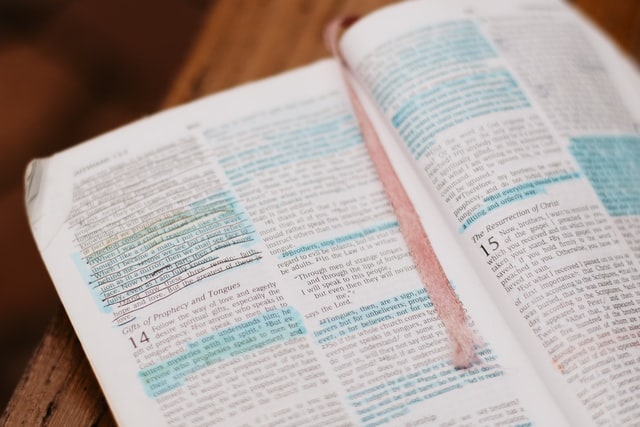
A reader asked how Grace fit into daily life after reading my post What is Grace? Part 1.
“I am just so hard on myself if I miss a day of reading the Bible and would love to understand how His grace is sufficient for me!”
Then she followed up with:
“I would love to hear your routine for daily time with the LORD if you don’t mind!”
What a challenge! The truth? Right now, I don’t have a daily routine. Seriously.
That’s not to say I wouldn’t like one. Like most folks, I’m a creature of habit. Unfortunately, with my husband and I both out of work, we’ve drifted into a “no routine” routine. I’ve decided that, for the moment, I don’t need to pile on any more stress than I already have. That doesn’t mean I wouldn’t benefit from a formalized routine; I’ve just chosen my battles, and that isn’t one of them.
Here’s why.
Shouldas, oughtas, and gottas
As Christians, we tend to have high expectations for ourselves and everyone around us. This is especially true about the things we think we are supposed to do to be good Christians. “Shouldas, oughtas, and gottas,” as a professor of mine called them.
Paul talks about this in his letter to the Romans. His audience for this letter was a combination of Jews and non-Jews. On the one hand, the Jews were used to having to follow all sorts of rules from the books of Moses (especially Leviticus and Deuteronomy) along with Rabbinical law. On the other hand, the Romans were used to different rules, where even family feasts were often served meat that had been dedicated to one Roman god or another. Some argued that the meat was taboo, while others basically said, “It’s just meat,” and as long as they weren’t worshiping in whatever temple it came from, who cared?
In chapter 7:21-23, Paul wraps up his argument against the Law by saying “I want to do the right thing, but I can’t seem to do it.” (my summary) He goes on with verse 24, (again my summary) “Who will rescue me? Thanks be to God–through Jesus!”
Then comes the capstone. “Therefore, there is now no condemnation for those who are in Christ Jesus.” (8:1, NIV)
So here is Paul the Apostle saying he can’t do the things he’s “supposed” to do. And then pulls the rug out and says all those Law things are no more, because Jesus fulfilled them once and for all by his death on the cross and resurrection. (That’s the rest of chapter 8.)

This takes the burden off our shoulders. Sure, reading the Bible daily is a good practice. It helps keep us focused on God, and how he has interacted with humankind in the past. And it helps us understand how God may be working in our lives now.
But the obligation is gone. Reading the Bible every day isn’t a sign of a good Christian. Lots of people read the Bible every day and are the most sour, bitter, and judgmental people you will ever meet. Just like many who faithfully go to church and then gossip and slander everyone they saw there.
Whether we are reading Scripture, doing a Bible study, praying, working, managing a family, or volunteering at a food bank, all of those things are most effective when we do them because we are grateful for the Love and Grace that God has shown us. If we do them for brownie points — or a punch to our martyr cards, as we used to say — we deny the power of the Cross.
It’s all about Relationship.
As Christians, we are in a relationship with God. It’s not what we do that’s important, but who we are.
My husband often works out of town. When he does, we try to talk on the phone every night. Sometimes it might be a couple of hours, sometimes fifteen minutes. Occasionally it’s a quick text: “I’m beat, going to bed. Talk tomorrow. Love you!” The amount of time isn’t crucial. And when it comes to housekeeping, he’s great at it, I’m not. But our relationship is built on our love for each other as we are, in all our strengths and weaknesses. We’re not perfect and we acknowledge that. But we are committed to working together, because we love each other.
In our relationship with God, he’s not asking us to follow a formulary of things to do to earn his favor. He wants us to get to know him, and open our eyes to see him working in the world around us. We don’t always have access to a Bible or computer to look scripture up. But the more we read it, and the more we encounter important passages like Romans 8:1, the more those truths stick in our brains and help us when things are confusing or bleak.
For example, forty-plus years ago, a professor of mine required us to memorize the whole chapter of Romans 8. He called it the best summary of the Gospel. (Others preferred John 3:16 as it was much shorter!)
Give or take 20 years later, I was in a dark place where even touching my Bible would send me into a panic attack or tears because of the pain caused by people associated with it. (For more about this see Faith and Foxholes .) That ol’ Chapter 8 kept rattling in my mind, along with a few others, and helped me realize that I hadn’t understood Grace at all.
Daily Grace for me means reminding myself throughout the day that I am a child of God.
My goal, you might say, is to be walking my talk. It doesn’t matter if I’m doing laundry or making the bed, I often talk to God out loud. “You know how much I hate job interviews. Thanks for the help from Kit to get over my fears.” “I’m really worried about [Friend]. Please work through her anger to get the help she needs.” If someone cuts me off in traffic, I’ll challenge myself to take a deep breath and bless them; I’m not in that big of a hurry, and I don’t know what’s happening in their lives. And so on.
If all that sounds like “saintly stuff”, it’s not. Remember, I don’t do them every day. I don’t think I’ve ever done all of them in one day! That’s not the point.
The gift of Grace is BEING: Loved, freed from the things you “should do, ought to do, have got to do”, and free to be the gifted person you are. The “doing” will flow naturally from that as you learn who you are in God’s eyes and that relationship grows.
So, while I don’t have a routine, there is one thing besides prayer that helps me through the day. [Note: This is not religion specific and can be beneficial to anyone.]
Gratitudes
The idea of Gratitudes is to write down things that you are grateful for in that moment. I try to write 5 things and give myself a time limit of 15 minutes. Sometimes I can fire off more; some days it might be only one or two. Neither the time nor the number really matters, but a shorter time is less intimidating.
On days I’m really down, I will make myself do it (when I remember), because I know it will help turn my thoughts in the right direction. I use a lovely blank book my sister gave me, but any notebook or even a small pad will do. (I once used an envelope while waiting at the doctor’s office.)
Gratitudes are usually simple. Example:
I am thankful that:
- The sun is out
- I am alive
- I can hear the birds
- I am loved by God and my husband
- My friend and I are having lunch today
Gratitudes often lead to prayers that I may write out or just name them to God. And if a Bible passage comes to mind, I’ll look it up if I can. In what context was it written? What might it have to do with what I’ve just been thinking? Also, I will often look it up in more than one translation or paraphrase, especially if it is super familiar. A different translation or paraphrase can encourage me to think about it in a new way.
Remember, I don’t do this every day. This isn’t a ritual. It would be a nice one, and I find it beneficial when I do it, but the moment I feel like I MUST, then it becomes a stone around my neck.
Often, my main Bible study comes when I want to refer to a scripture passage in my writing. I don’t wish to mislead anyone, and I have discarded verses when I realized they were out of context and searched for new ones.
The point.
Jesus said quite simply, “Love the Lord your God…..and love your neighbor as yourself.” (Matthew 22:37,39 NIV) How you go about doing that is up to you, your gifts, and your walk. Sure, you want to read the Word. But it’s not a requirement and certainly not a penance!
The Bible is neither a textbook nor a life manual, even though many try to make it so. (The thief on the cross didn’t have one, and he didn’t need it.) So, there is no reason to beat yourself up about when you read your Bible, or how often, or how you say your prayers, or any of the other expectations you or anyone else wants to put on you.

The Bible is the Love letter from God to his whole Creation. To you and me. His Spirit works within us to help understand it. But the Spirit works through others, too, believers and non-believers, and through the glory and the brokenness we see in Nature. So, we keep our eyes and hearts open to what God is trying to teach us.
The point is learning what it is to be from God’s perspective — the perspective of Grace: Loved. Forgiven. Free. Made new. Growing. Learning. It’s a process, and any doing is simply a part of the journey. And everyone’s journey is different.
Grace, Peace and Hugs to you!